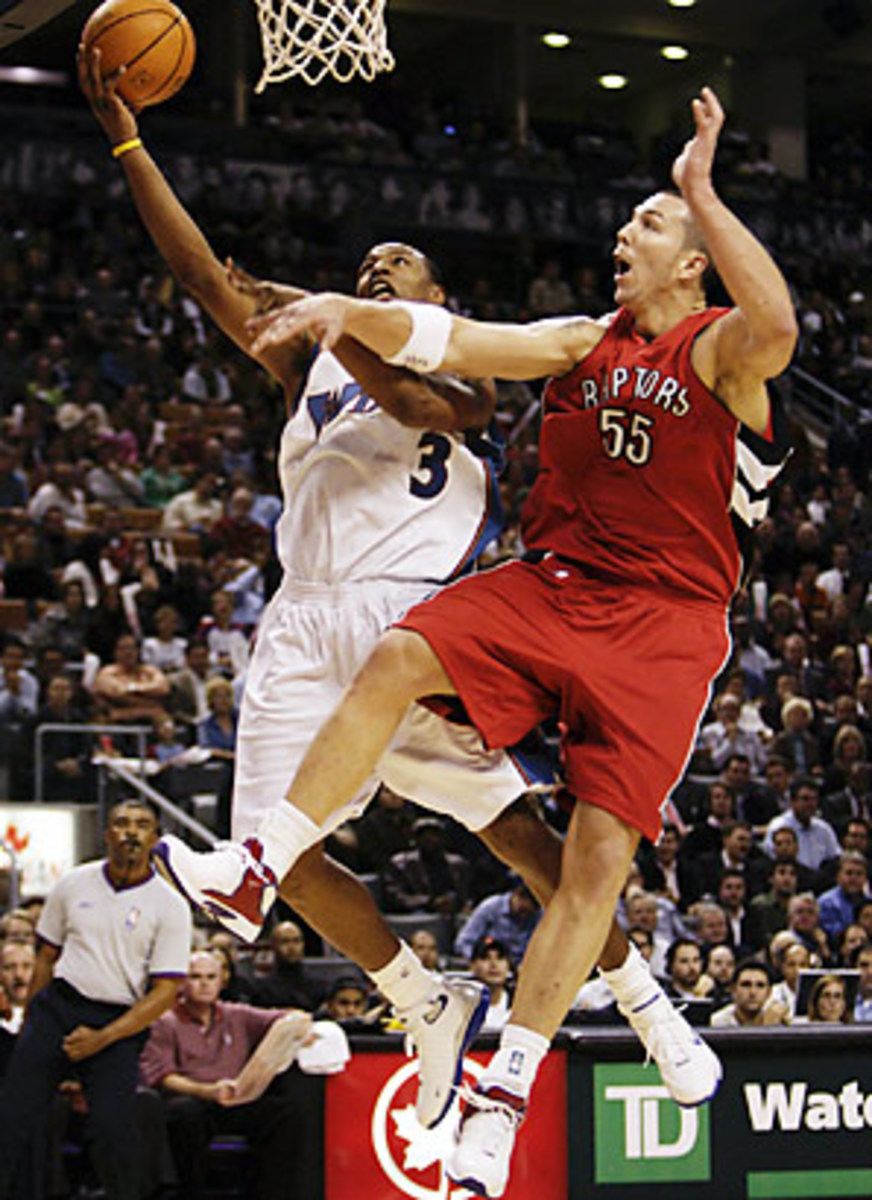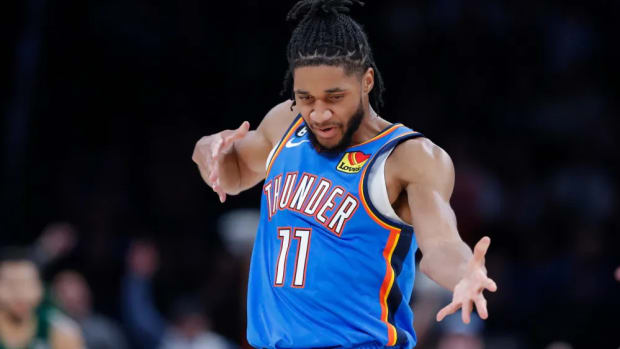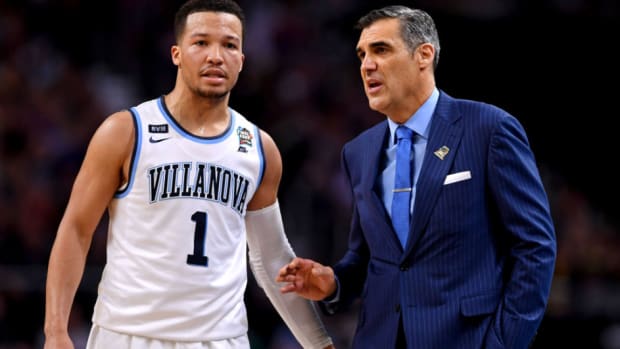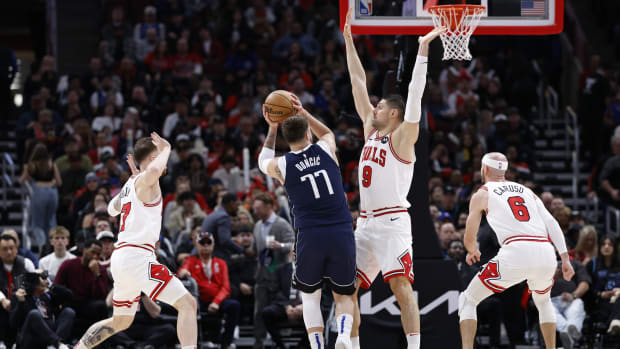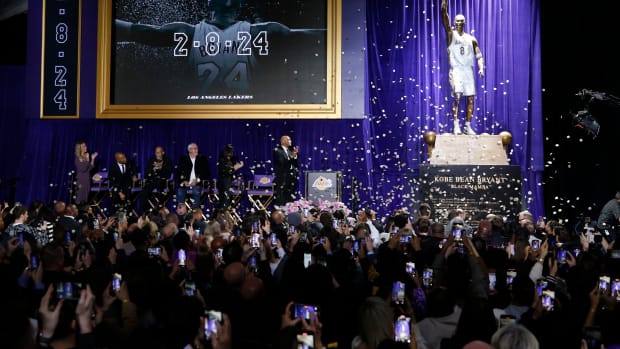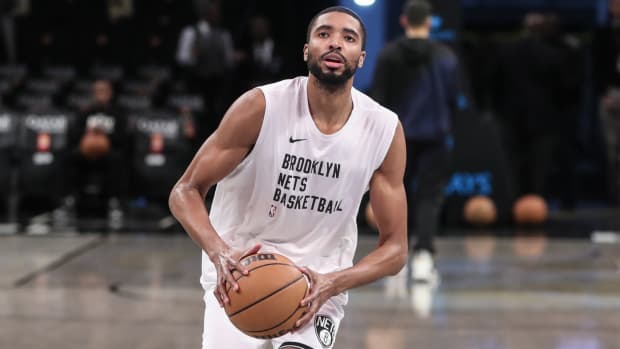Howard a rare gem in 2004 draft class that tripped up many a team
The Celtics surely had championship dreams when they drafted the high school center in 2004; every team fantasizes of plucking that one phenom whose blossoming talent can be leveraged into a title. But in choosing Jefferson 15 picks into the draft, Boston general manager Danny Ainge actually fulfilled that championship narrative -- sort of.
Just four years after selecting Jefferson, the Celtics were cracking open champagne bottles in June again in large part due to drafting and developing Jefferson that night. Only, Jefferson -- who became the centerpiece to the trade that brought Kevin Garnett, and a championship, to Boston -- never got a taste.
That's just one of the oddities of the 2004 draft, one of the most confounding talent markets in recent NBA history. The deepest class of high school applicants ever, plus a growing wave of Europeans, made scouting and player evaluation especially critical -- and eminently unpredictable. Even the No. 1 pick created an uncommon debate, with Orlando general manager John Weisbrod defying conventional wisdom by passing up experienced collegian Emeka Okafor to draft 18-year-old Dwight Howard.
Most scouts say a draft can't be accurately evaluated until five years later. But even with that half-decade of perspective, what's most clear today is how little was clear back then. "The least predictable draft ever," Sports Illustrated called it ahead of time, and that turned out to be just about the only prediction that came true. (Indeed, after the draft, SI declared the Jazz winners for adding Kris Humphries and Kirk Snyder, who have since been traded into obscurity. The magazine also identified lottery picks Shaun Livingstonand Robert Swift and No. 19 Dorell Wright as future All-Stars. Slowed by injury and ineffectiveness, the three players have appeared in fewer than one-third of their teams' games, with little impact.)
Only one scorer from the Class of 2004 has averaged 24 points over a whole season -- and he wasn't among the top 25 draftees, much less a lottery pick. Only one '04 rookie point guard has accumulated a five-assist-per-game average in his first five NBA seasons -- and he wasn't even a first-rounder. (Got a guess? Answer later.)
OK, drafting inexperienced kids in the teens and 20s is a crapshoot by nature, and there are unexpected successes and shocking flameouts each year. But the bizarro '04 class, which saw eight preps and six foreign players drafted in the first round alone, takes the fortune-or-failure ratio to extremes. Three of the first 10 players chosen (No. 8 Rafael Araujo, No. 10 Luke Jackson and No. 6 Josh Childress, self-exiled to Greece in a contract dispute) are out of the league, and Livingston (No. 4), his left knee rebuilt after a devastating injury, was released twice last season.
Meanwhile, All-Star guard Jameer Nelson lasted until the 20th pick and is now a starter on a championship contender. Josh Smith (17th, Atlanta) and J.R. Smith (18th, New Orleans, but now in Denver) are 15-point scorers on playoff teams. Kings guard Kevin Martin, whose 24.6-point average two seasons ago is the best scoring year yet among this group, fell to No. 26. Sasha Vujacic (27th), Beno Udrih (28th) and Anderson Varejao (30th) have all played supporting roles on NBA finalists. Knicks point guard Chris Duhon, whose five-assist-per-game career average leads all '04 draftees, dropped into the second round, where the Bulls plucked him at No. 38.
And how often does the second-best player in a draft wind up being picked outside the lottery? It happened to Jefferson, who landed with the Celtics, at No. 15. And after two low-impact seasons in Boston, the 6-foot-10 forward-center lost weight, found a go-to low-post move and burst toward stardom with a 16-point, 11-rebound season that helped persuade former Timberwolves vice president Kevin McHale to part with Garnett. Just imagine how NBA history might be different -- Garnett to the Lakers, perhaps? -- if Jefferson had not had his breakout season.
"I'm glad Al's going to the Western Conference," Ainge said after sending Jefferson and four other players to Minnesota for Garnett, the former MVP who helped deliver the '08 title to Boston. "He's going to be a big star."
Looks like it. Jefferson has averaged 21.8 points and 11.1 rebounds for the Timberwolves, and has vowed to return strong from knee surgery that prematurely ended his season last February.
So how would that '04 draft stack up if everyone got a do-over today? Here's a guess at the lottery picks:
1. Orlando: Dwight Howard. History has vindicated Weisbrod's gamble on the humble Georgian, who helped carry his formerly downtrodden franchise into the NBA Finals last spring. It's easy to forget now, but the decision was viewed five years ago as a terrifying risk, a Mario Williams-over-Reggie Bush roll of the dice.
2. Charlotte: Al Jefferson. Points have always been a problem for the Bobcats, but a talented scorer up front may have changed things.
3. Chicago:Andre Iguodala. Bulls take the Springfield, Ill., native, who has emerged as a 20-point scorer and franchise talent.
4. L.A. Clippers:Devin Harris. Quick point guard has developed into an All-Star.
5. Washington:Ben Gordon. The 20-point streak shooter could have provided more firepower to the Gilbert Arenas-led backcourt.
6. Atlanta:Luol Deng. Hawks get the defender they thought they drafted in Childress, with added scoring as a plus.
7. Phoenix: Kevin Martin. Imagine his run-and-gun scoring game with Steve Nash as the triggerman.
8. Toronto: Emeka Okafor. He was Rookie of the Year after putting up a 15.1-point, 10.9-board season, but gradually faded as the Bobcats' centerpiece. If he had Chris Bosh to take pressure off, perhaps he would become a consistent force.
9. Philadelphia: Jameer Nelson. A hometown hero from St. Joseph's; think he'd sell any tickets?
10. Cleveland: Josh Smith. Replacing Carlos Boozer would have been so much easier.
11. Golden State: Anderson Varejao. His joy for the game would fit well with Don Nelson.
12. Seattle:Andris Biedrins. The smooth pivotman they had hoped Swift would turn into.
13. Portland:Delonte West. Another strong option at point guard.
14. Utah:Trevor Ariza. He's turning into a reliable defender, a good fit for the Jazz.
That's a lot of NBA history changed, though who could predict how those pairings would have worked? After all, just about everything about the weird 2004 draft was impossible to predict.






























